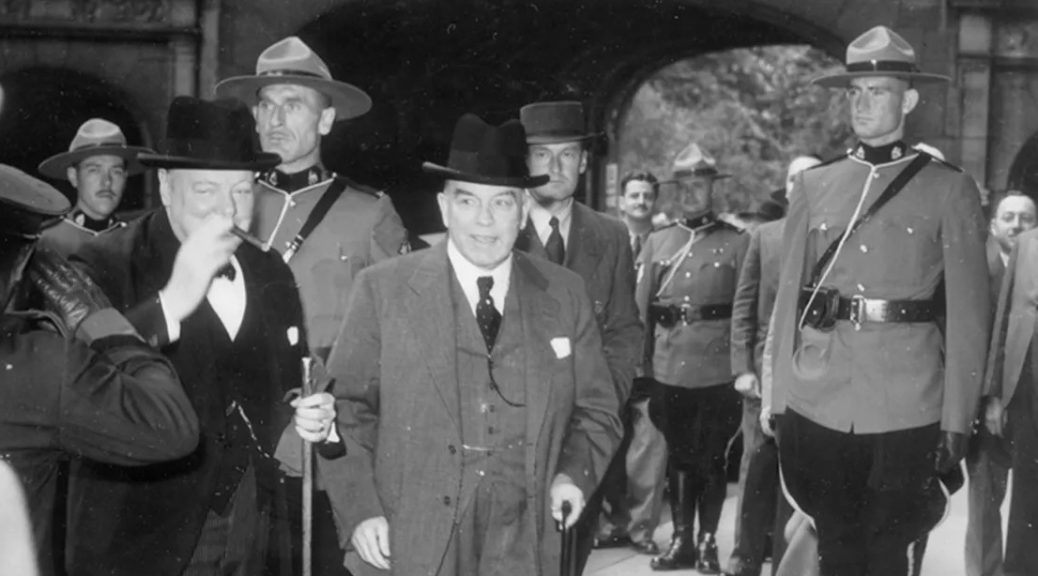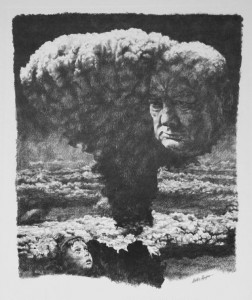
Shocking Facts: “Nuclear Armageddon” Then and Now
Nuclear armageddon, then and now
5 November 2015— A call from the London Daily Mail: “We are doing a piece on a new book and wanted to run it by you.” The book was Thomas Maier’s When Lions Roar: The Churchills and the Kennedys. They were excited about their discovery therein of a Shocking Fact about Winston Churchill. (Shocking Fact #2385, by my count.)
Mr. Maier had recorded, calmly and dispassionately, a 1947 conversation between Churchill and Senator Stiles Bridges (R-N.H.). Churchill told Bridges “that if an atomic bomb could be dropped on the Kremlin wiping it out, it would be a very easy problem to handle the balance of Russia, which would be without direction.”
So—wow—the Mail was really onto an exposé. And their question for me was: “Did you know Churchill wanted the Americans to bomb Russia?”
Flash forward to 2022 and the President of the United States, saying (not so privately) that we are on the brink of nuclear Armageddon. It’s the closest we’ve come, he says, since the 1962 Cuban Missile Crisis. It may be interesting to compare the these two apocalyptic visions and the settings in which they occurred. (Remembering, of course, that in 1947 the Russians couldn’t nuke us in return.)
Shocking fact 2385
The Shocking Fact about Churchill contemplating nuking Moscow has been known for over half a century. Churchill’s momentary private thoughts were first revealed in his doctor’s diaries in 1966. According to Lord Moran, on 8 August 1946, WSC said:
America knows that 52% of Russia’s motor industry is in Moscow and could be wiped out by a single bomb. It might mean wiping out three million people, but they would think nothing of that…. They think more of erasing a historical building like the Kremlin.”

“The story is not new,” I told the Mail. Indeed around the same time, Churchill said something similar to Canadian Prime Minister MacKenzie King, known since 1970:
The West should make it clear that the Soviet Union must not extend its regime any further in Western Europe, Churchill argued. He added that if the Soviets did not accept the ultimatum, a Western leader should tell them straight “We will attack Moscow and your other cities and destroy them with atomic bombs from the air.” (The MacKenzie King Record vol. 4, 1970, in Graham Farmelo, Churchill’s Bomb, 339).
What’s the difference?
Churchill voiced his thought privately in chats with individuals. Biden voiced his in a fundraiser, where it was quickly picked up and circulated by the media, then walked back by the White House. He was, er, you know, just thinking out loud. What he meant by raising it publicly remains obscure. What Churchill intended by his more private remarks in 1947 is clearer.
Churchill occasionally voiced apocalyptic notions in private, to see what the reaction would be. A critical but balanced biographer, Anthony Seldon, wrote in Churchill’s Indian Summer: “Churchill’s style of tossing ideas around with his companion, often to test their effect, mistakenly inclined Moran to give these half-formed thoughts and suggestions a status of hard fact.” And not just Moran. Bridges and King were certainly taken aback sufficiently to record it.
As Leader of the Opposition (which he then was), Churchill never formally proposed to bomb Moscow. He never urged it upon President Truman or the State Department. Churchill’s formal statements had a different tack, as Graham Farmelo correctly reported (and the Daily Mail didn’t):
This was the zenith of Churchill’s nuclear bellicosity. He soon softened his line. In the House of Commons he went no further than the words he used after British relations with the Soviet Union deteriorated again, in January 1948: the best chance of avoiding war was “to bring matters to a head with the Soviet Government…to arrive at a lasting settlement.”
What the Mail reported
I emailed all this to the Mail‘s reporter, adding:
Winston Churchill’s “bid to nuke Russia” to win Cold War – uncovered…. Winston Churchill urged the United States to launch a nuclear attack on the Soviet Union to win the Cold War, a newly released document reveals. Read the full story.
What Churchill really wanted
Churchill, however, always had second and third thoughts, and they usually improved as he went along. It was part of his pattern of response to any political issue that while his early reactions were often emotional, and even unworthy of him, they were usually succeeded by reason and generosity. (The Last Lion, vol. 1, 843-44.)






